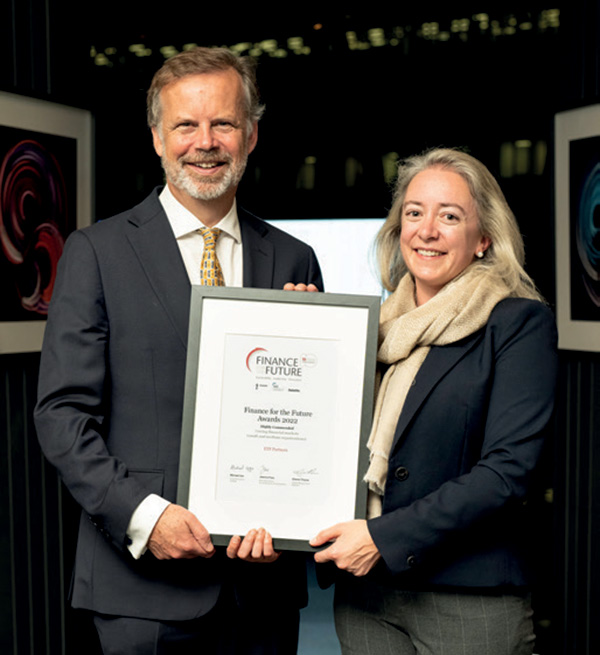What?
ETF Partners is a venture capital firm focused on environmental technology. The company calls its investment thesis ‘sustainability through innovation’. Since being founded in 2006, the company has identified and backed young, fast-growing European companies that have the potential to deliver positive environmental impact and financial performance.
Investments are selected for five core investment themes: future mobility, energy transition, green connectivity, responsible consumer and sustainable food. Drawing on its experience, the company considers these to be high-impact areas where the best opportunities can be found.
An impact scorecard that combines qualitative and quantitative data guides ETF Partners’ choice of investments and is used for ongoing monitoring. The scorecard covers five pillars: alignment with the UN Sustainable Development Goals, impact potential, additionality through innovation, impact performance and financial maturity. Each investee company also has bespoke impact KPIs for measuring progress, designed to suit that specific business.
The investment team provides individualised support to investee companies, supporting them to embed sustainable practices and grow financially. To enable this level of engagement, each fund is limited to between 15 and 20 companies. ETF Partners also builds strong relationships with the investors in its funds, which include financial investors, pension funds, corporations and high net worth individuals.
ETF Partners leverages venture capital techniques to upscale technological innovation to address climate change. The judges were impressed with its long-standing experience in this field, and its philosophy that if it cannot determine a potential sizeable climate related impact up front, then it doesn’t invest.
Why?
The co-founders of ETF Partners believed that investing in environmental technology was key to addressing climate change. Their experience in venture capital had also shown them that venture capital offered an important tool for driving change – both in individual companies and the markets as a whole.
ETF Partners brings these two ideas together, and its founding principle of sustainability through innovation has continued to be the driving force of the company.
By concentrating on young companies, ETF Partners can help organisations understand how to drive impact at the same time as financial returns, while they are still at the beginning of their development. ETF Partners also aims to support its investee companies with embedding best practices, enabling them to establish a strong culture and sustainable business from the start. This is where the company felt it could make the biggest difference.
We keep a close eye on how other people measure impact, but we evolved our own methodology because none existed. But we’re not satisfied. We are the first to criticise our own approach and try to improve it on a regular basis. Because there’s a real need for a simple common language here which doesn’t really yet exist.

How?
ETF Partners works intensively with companies to create impact:
- Environmental impact is considered from the earliest stages. The investment team performs an initial screening check, looking at the company’s potential impact and how this could be measured. If this screening check indicates that the company would not meet impact expectations, ETF Partners will generally not spend further time assessing the company.
- When applying ETF Partners’ impact scorecard to a potential investment, the investment team uses a mix of qualitative and quantitative data to score a company from 0 to 5 against each of the five pillars. Once the team has decided to invest, it continues to evaluate a company against the scorecard quarterly.
- ETF Partners continually evaluates the scorecard, refining the methodology and incorporating new sustainability standards into its assessments as those standards emerge. Financial maturity has always been a key part of assessments, as companies can only achieve impact at scale if they are also growing and maturing financially.
- Each investee company also has its own impact KPIs. ETF Partners looks in-depth at how each company creates impact and uses this to tailor KPIs for the company. Each bespoke KPI is designed to be directly measurable by the company, which will then report against the KPI to ETF Partners. ETF Partners works closely with the company, helping it to accelerate progress against the impact KPI.
- Support for investee companies ranges from coaching for CEOs to introducing the companies to new markets. To formalise and embed its support, ETF Partners takes a seat on the board for each investee company. The ETF Partners board member makes sure that a sustainability lens is applied during the company’s strategic and operational planning.
- ETF Partners reports to investors quarterly and annually on impact. Beyond this reporting, the company actively works to develop strong relationships with its investors. In a monthly ‘corporate club’, the company talks to a number of corporate investors about sustainability megatrends and the corporations’ views and needs on sustainability. ETF Partners also co-invests with the investors to make sure that their interests are aligned.
- Industry engagement is another important part of ETF Partners’ activities. The company is committed to sharing with others what it has learned about impact measurement and responsible investing over its 16 years of operations. It also wants to draw on its experience to help shape future regulation in this area. Members of the team sit on committees and advisory boards and are active in industry trade bodies.
Download the case study
Want a copy of this case study? You can download a PDF version using the link below.
